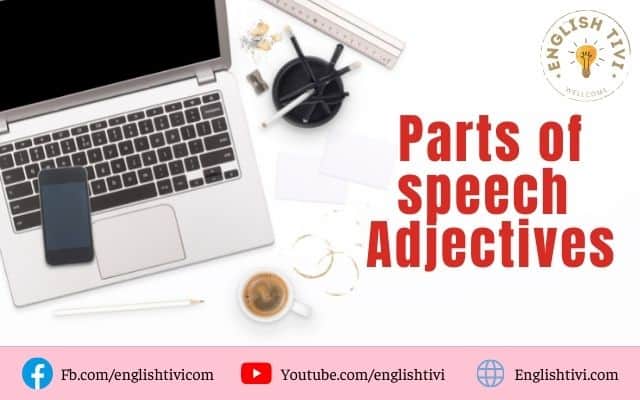How many parts of speech are there in English?
There are eight parts of speech in English: noun, adjective, adverb, pronoun, verb, preposition, conjunction, and interjection.
⏩ Sign Up to Get Bonus
8 Parts of speech in English grammar
Noun – Parts Of Speech – English Grammar
Adjective – Parts Of Speech – English Grammar
Here in this lesson, we will cover the Adjective and then we will move ahead with others. Now learn What is it? What is its definition? What is the use of it? and what are its kinds or types etc?
Let’s learn with English tivi on the topic: Adjective – Parts Of Speech – English Grammar right now!

1. Definition
It is a word that indicates a quality of a person or thing referred to by a noun. On the other hand, and it is a word that modifies a noun or a pronoun.
2. Kinds of Adjectives
- Proper
- Descriptive
- Quantitative
- Numerical
- Demonstrative
- Distributive
- Possessive
- Interrogative
2.1 Proper Adjective
It's formed from proper nouns.
- France => French
- Cambodia => Cambodian
- America => American
- Canada => Canadian
Examples:
- Cambodian people want to live in peace and democracy.
- Two French dancers are famous for performance day.
2.2 Descriptive Adjectives
It tell something about the appearance, natural , or properties of the nouns.
| Big | Small | Long | Short | Clever |
| Pretty | Beautiful | Lazy | Hard-working | Tired |
| Hungry | Angry | Dizzy | Sad | Delighted |
Examples:
- Many people like him because he is hard-working person.
- Sad movie always make me cry.
- He shows stubborn resistance to change internal regulations.
2.3 Quantitative Adjectives
It stand before nouns to show a certain quality.
| Many | Much | A lot of | Lot of | Some |
| Any | Little | Little | A few | Few |
| Several | Plenty of | A couple of | A pair of | A hundred |
Examples:
- There was lots of money in the safe.
- Why don't you give her some flowers?
- My family has few problems , so we don't care.
- Vuthy is not a good person because he has got little patience.
- Does she have much money in the bank?
2.4 Numerical Adjectives
It's cardinal and ordinal numbers.
2.4.1 Cardinal numbers
- One, two, three, four, five, six, seven, eight, nine, ten.
- Eleven, twelve, thirteen, fourteen, fifteen, sixteen, seventeen.
- Eighteen, nineteen, twenty, thirty, forty, fifty, sixty…
2.4.2 Ordinal numbers
- First, second, third, fourth, fifth, sixth, seventh, eighth.
- Ninth, tenth, eleventh, twelfth, thirtieth, fortieth, fiftieth.
- Sixtieth, twenty-first, twenty-second, twenty-third…
2.5 Demonstrative Adjectives
It's to point a person or thing.
| this | these | that | those | such a |
- This girl goes with me and that boy stays here.
- These scandals have to be solved soon.
- That boy is industrial and reliable.
- I don't like such a hungry. I'll drive you home soon.
- Don't be in such things. I don't want to be involved in them.
2.6 Distributive Adjectives or Definite Determiner
It refer to each individual of a class not to the class collectively.
| each | every | either | neither | enough |
| another | other | all | no | both |
Examples:
- Each man had a weapon along the street yesterday.
- Look at those girls walking. Each girl is pretty.
- Every person wants to live in peace and democracy.
- Either girl is loyal to every boy.
| Enough + noun but adverb or adjective + enough |
Examples:
- There aren't enough cars for all of us to go.
- Surely 15 minutes enough time to have a coffee.
- My car is expensive enough.
- She tries to work hard enough.
| another + singular noun | the other + singular noun |
| other + plural noun | other + uncountable noun |
| the other + plural noun | The other + uncountable noun |
2.7 Possessive Adjectives
It stand before nouns to show possession.
- I => my
- You => your
- We => our
- They => their
- He => his
- She => her
- It => its
Examples:
- My students usually pay attention to the special English grammar.
- Our parents went to America last week.
2.8 Interrogative Adjectives
It's used to make questions.
| What | Which | Whose |
Examples:
- What books do you study every day? I study a special English grammar book.
- Which girl do you want to marry? I want to get married to the girl whom I love.
- Whose car is this? It's Davy's. It's my uncle and aunts.
3. Formula of Adjectives
| 3.1 Noun + y = > Adjective |
| 3.2 Noun + ful = > Adjective |
| 3.3 Noun + less = > Adjective |
| 3.4 … ous, ious, eous = > Adjective |
| 3.5 … ant, ent = > Adjective |
| 3.6 … al, ial = > Adjective |
| 3.7 … ible, able = > Adjective |
| 3.8 … ic = > Adjective |
| 3.9 … y = > Adjective |
4. Participle as Adjectives
4.1 Formulation of Participles
- Bore = > Bored = > Boring
- Interest = > Interested = > Interesting
4.2 Present Participles as Adjectives
The present participle { verb + ing } is used when the noun is modifier performs or is responsible for an action.
Examples:
- The crying baby woke me last night.
- The singing girl is my cousin.
4.3 Present Participles as Adjectives
The past participle { verb + ed } or irregular verb is used as when the noun it modifies is the receiver of the action. The sentence from which it comes generally in the passive aspects.
Examples:
- The blocked road was opened yesterday.
- A written report is involved in corrupt officials.
- His stolen money is $100.
- Frozen food is often easier to prepare than fresh food.
5. Positions of Adjectives in Each Sentence
5.1 Adjective Order
- Articles. demonstrative pronoun, possessive ( a, an, the, this, that, these, her, their … )
- Quantity ( two, fifty, some, many, a ( few )
- Opinion ( poor, beautiful, interesting. … )
- Appearance ( big, short, long, broken, hungry … )
- Age, color ( old, new, young, black, white … )
- Nationality, religion ( Muslim, European . .. )
- Material/purpose ( silk, wood, swimming, reading)
- Noun
5.2 Generally before nouns
- Do you want to get a really good knowledge of English?
- I don't want to leave my beloved country.
- Miss Huey is a beautiful girl, so I want to marry her.
5.3 After linking verbs
- Navy looks pale this morning.
- Your wife stays pretty although she has three children.
5.4 After nouns
- We set your brother free, so he is very happy.
- Don't kill him. I want you to arrest him alive.
6. Comparative and Superlative Adjectives
6.1 Equal Comparison
| Subject + verb + as + adjective + as + noun or pronoun. |
| Subject + verb + the same + noun + as + noun or pronoun. |
| Subject + verb + as + (much, many, little, few) + noun + as + noun or pronoun. |
Examples:
- My boyfriend is as beautiful as yours.
- Mary makes the same salary as I.
- I have as much as money as you.
6.2 Unequal Comparison
| Subject + verb + as + (adjective + er, more + adjective, less +adjective) + than + noun or pronoun. |
| Subject + verb + (far, much) +adjective + er + than + noun or pronoun. |
Examples:
- She is clever than him, but he is luckier than her.
- You are much fatter than me.
- Dara is far prettier than Makara.
| Subject + verb +( far, much) + (more, less) + adjective + than + noun or pronoun. |
| Subject + verb + (adjective ter and adjective + er; less and less + adjective; more and more + adjective) |
Examples:
- Sophea is much more beautiful than Bopha.
- My house is far more modern than yours.
- It's becoming harder and harder to find a job in Cambodia.
- She became less and less interested.
| The comparative adj + Sverb , + the comparative + adj + S + verb |
| Subject + verb + (much, more, less) + noun + than + noun or pronoun |
Examples:
- The richer I am, the poorer my friend is.
- The warmer the weather is, the better I feel.
- I have more money than he.
- Their job allows them less freedom than ours does.
6.3 Superlative Adjectives
| Subject + verb + the + (adjective + er; most + Adjective; least + Adjective) + noun or pronoun |
Examples:
- What is the longest river in the world?
- My eldest daughter is 17 years old.
- Oxford is one of the oldest universities in Europe.
- The boy gave us the least small guavas.
- Who is the richest man in the world?
In this English grammar compilation, you will learn all the grammar basics you need. We will explain you grammatical rules through examples and easy-to-understand explanation to make your learning experience fun.
Conclusion
Above is a summary of Parts of speech: Adjectives. Hopefully, we have contributed to help you learn English in general, become more accessible and more interesting. Good luck with your studies and soon!
In addition, you can refer to many other basic English test preparation materials, such as English words, English grammar, English sentences, … are constantly updating on Englishtivi.com
Subscribe to the English tivi channel on Youtube to improve your English learning skills!




